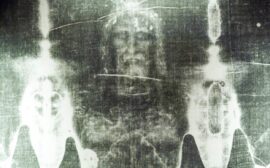By: Daniel Sloan, Ph.D. | April 7, 2024
As we exit the Easter Season, many of us have spent the last several weeks looking at various Messianic Prophecies about the death, burial and resurrection of Jesus. When most Christians think of Messianic prophecy, they think of the passages in the New Testament about Jesus that are directly quoted from the Old Testament, like when the scribes quoted Micah 5:2 when the wise men asked about the location of the birth of the Messiah. However, knowing which prophecies in the Old Testament are truly Messianic, how much the prophets knew about the coming Messiah and how much the people in Jesus’ day should have known about Jesus’ mission are areas that are open to great debate in our time.
Recently, several books have been written on understanding these issues from various theological perspectives.[1] The question then becomes, what are minimum criteria that Evangelicals can agree on that is established by the Bible on the issue of Messianic Prophecy? Three definitive criteria can be established from the pages of the New Testament.
Criteria of Some Knowledge of a Messiah’s Presence
First, the New Testament establishes that there was at least some knowledge of the future Messiah by the Old Testament saints. In John 8:56, Jesus told the Jewish leaders, “Your father Abraham rejoiced to see My day, wand he saw it and was glad” (NKJV). During Peter’s sermon on Pentecost, he declared that David, “Therefore, being a prophet, and knowing that God had sworn with an oath to him that of the fruit of his body, according to the flesh, He would raise up the Christ to sit on his throne, he, foreseeing this, spoke concerning the resurrection of the Christ, that His soul was not left in Hades, nor did His flesh see corruption” (Acts 2:30-31).
In Luke 10:24, Jesus told the disciples, “For I tell you that many prophets and kings desired to see what you see, and did not see it, and to hear what you hear, and did not hear it.” Scholars disagree on how much these prophets specifically knew about the coming Messiah, but it is clear that the New Testament asserts that these prophets knew at least something about the future coming Messiah.
Criteria of Some Knowledge of the Messiah’s Mission
Second, the New Testament world should have had a better understanding of Jesus’ primary mission. Sometimes scholars will argue that because none of the disciples appeared to understand Jesus’ mission prior to the cross and that there is little record of a “dying Messiah” in Jewish thought prior to the coming of Jesus, that this means that the New Testament world could not have understood the real mission of Jesus. However, Luke 24:25-26 appears to argue against this, at least to a point. Jesus, talking to two disciples on the road to Emmaus, stated, “O foolish ones, and slow of heart to believe in all that the prophets have spoken! Ought not the Christ to have suffered these things and to enter into His glory?”
Interestingly, Jesus did not tell them they should have known about His suffering because He had told them about His death several times throughout His ministry. Instead, Jesus argued that it was the prophets that stated that the Messiah ought to suffer. Perhaps Jesus had in mind such passages as Isaiah 53 and Daniel 9:24-27. By saying that the disciples were foolish and slow of heart to believe, it certainly seems that Jesus was arguing that it was possible to believe the message of the prophets prior to the resurrection.
It is up for scholarly debate exactly how much content the people of Jesus’ day should have known about His ultimate mission, but it is fairly clear that the New Testament world should have had a better understanding, at least to some extent, of His mission. If it was completely impossible to understand the prophets prior to the resurrection, as some scholars argue, then it would seem cruel for Jesus to make His statement to the Cleopas and the other disciple in Luke 24.
Criteria of Post-Resurrection Clarity of the Messiah’s Role
Finally, there was definitely a greater clarity of the Messianic prophecies after the Resurrection of Jesus. This is not to contradict the previous point, but simply to show that after the resurrection, Jesus twice explained the Old Testament Messianic prophecies, expanding the understanding of His audience. First, in Luke 24:27, the verse directly after his condemnation of Cleopas and the other disciple, Luke writes that, “And beginning at Moses and all the Prophets, He expounded to them in all the Scriptures the things concerning Himself.”
Then, a few verses later in Luke 24, after Jesus appeared to the disciples in the Upper Room, Luke writes that Jesus told them, “These are the words which I spoke to you while I was still with you, that all things must be fulfilled which were written in the Law of Moses and the Prophets and the Psalms concerning Me.” And He opened their understanding, that they might comprehend the Scriptures.” Thus, in at least two instances Jesus opened the understanding of His disciples after the resurrection and explained to them which Old Testament prophecies were about Himself. Therefore, when Matthew and John wrote their Gospels and connected various Old Testament passages as being fulfilled in the ministry of Jesus, it was Jesus Himself who had made these connections.[2]
Conclusion
In conclusion, while there is certainly much room for debate on various issues within Messianic Prophecy and how much information individuals did know or should have known, we have seen through the New Testament that three criteria established are that there was at least some knowledge of the future Messiah by the Old Testament saints, the New Testament world should have had a better understanding of Jesus’ primary mission and finally there was definitely a greater clarity of the Messianic prophecies after the Resurrection of Jesus. While Evangelicals can disagree on many of the details of these criteria, the criteria themselves are firmly established in the New Testament and should be held at all costs.
Bibliography
Abernethy, Andrew and Goswell, Gregory. God’s Messiah in the Old Testament. Grand Rapids: Baker Academic, 2020.
Tabb, Brian J., and Andrew M. King, eds. Five Views on Christ in the Old Testament. Grand Rapids: Zondervan Academic, 2023.
Rydelnik, Michael, and Edwin Blum, eds. The Moody Handbook of Messianic Prophecy: Studies and Expositions of the Messiah in the Old Testament. Chicago: Moody Publishers, 2019.
About the Author
Daniel Sloan, Ph.D.
Daniel Sloan is an Adjunct Professor at Liberty University. He was mentored by the late Dr. Ed Hindson. After Dr. Hindson’s untimely passing, Dr. Sloan was allowed to teach some of Dr. Hindson’s classes. In addition to his teaching duties, Dr. Sloan serves as an Associate Pastor at Safe Harbor Community Church in Lynchburg, Virginia. Daniel graduated with his PhD in Theology and Apologetics from Liberty University. His research and expertise is in Old Testament studies. He and his wife, Natalie, live in Lynchburg, Virginia. Along with his extensive knowledge of the Bible, Daniel is an avid sports fan.
Notes
[1] See Five Views on Christ in the Old Testament, God’s Messiah in the Old Testament and The Moody Handbook of Messianic Prophecy: Studies and Expositions of the Messiah in the Old Testament.
[2] Similarly, Mark and Luke would have received this information directly from the Apostles.
(c) 2024. Bellator Christi.






